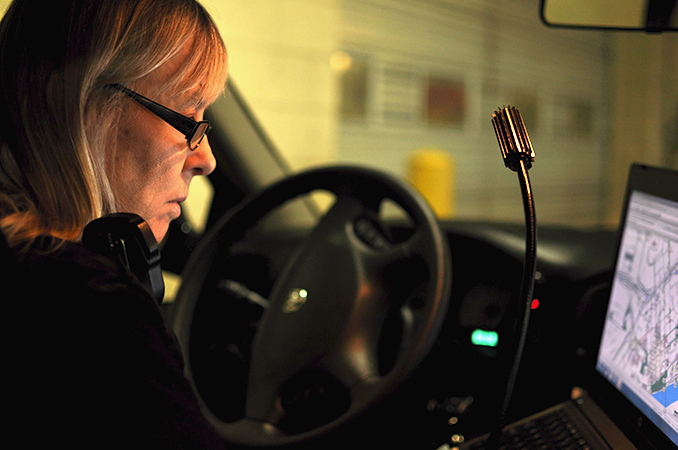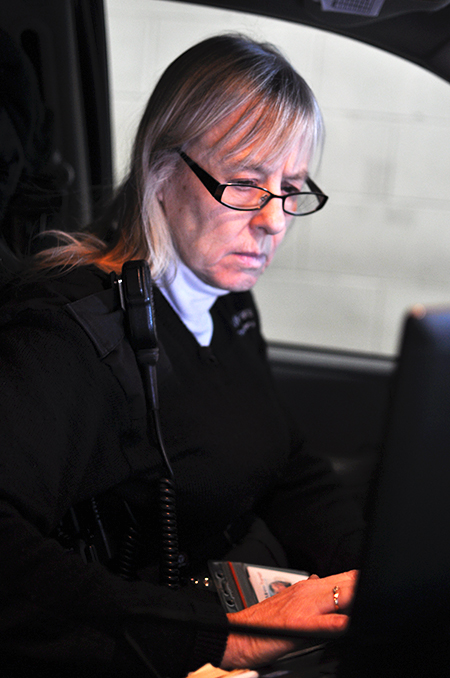 As a New Hope police officer, Debra Downing patrolled an area of just five square miles. As one of Metro Transit’s Transit Supervisors, she has a little more territory to cover.
As a New Hope police officer, Debra Downing patrolled an area of just five square miles. As one of Metro Transit’s Transit Supervisors, she has a little more territory to cover.
While she is based at East Metro Garage in St. Paul, Downing is an “at large” supervisor who travels Metro Transit’s entire 907-square-mile service area supporting bus drivers as they deal with detours, weather and other issues that interrupt normal operations.
“That’s why this job sounded so intriguing,” Downing said recently. “The thought of this huge area, it was like, ‘This is awesome.’”
After 26 years at the New Hope Police Department, Downing moved into the Transit Supervisor role full-time in 2006. Though she suddenly faced a bigger job, she had some idea of what to expect: for 18 years, she worked part-time riding and policing buses for Metro Transit.
While she no longer carries a badge, Downing says there are elements of police work that have carried over into her supervisor role. Metro Transit’s 27 Transit Supervisors respond along with police when operators are assaulted, a bus is involved in a collision or when streets are unexpectedly closed.
Supervisors also help manage transportation in and around major events like the Twin Cities Marathon and St. Paul Winter Carnival.
This summer, at the height of construction season, there were 288 active detours that supervisors helped bus drivers and transit customers navigate around. Supervisors work with public works and city staff to find the best alternative, and then communicate that to operators and customers.
“You really have to be able to think on your feet and sort it out,” Downing said from her supervisor’s vehicle, outfitted with a laptop that allows her to track bus activity in real time. “Figuring it out on the fly – that’s what’s fun for me.”
One of the biggest similarities between being an officer and being a Transit Supervisor is the need to respond quickly, Downing said.
Metro Transit helps respond to fires or other disasters where people are displaced, providing buses that serve not just as transportation but as mobile warming stations. In 2008, Downing was among a group that responded when tornados hit Hugo.
 Supervisors’ quick reflexes also kick in when winter weather strikes. Amid the first large snowfall of the winter, Downing was called to the corner of Camelot Street and California Avenue, in St. Paul, where a bus couldn’t get up a slippery hill. Downing spread sand behind each of the rear tires and the bus was quickly on its way.
Supervisors’ quick reflexes also kick in when winter weather strikes. Amid the first large snowfall of the winter, Downing was called to the corner of Camelot Street and California Avenue, in St. Paul, where a bus couldn’t get up a slippery hill. Downing spread sand behind each of the rear tires and the bus was quickly on its way.
Downing responded similarly throughout the night and knows she’ll be spending plenty of time in and around St. Paul this winter. The east metro’s hilly terrain makes it harder for buses to get around.
“Obviously, with weather like this we’re pretty busy, going from call to call,” Downing said.
In their rare quiet moments, Transit Supervisors observe operators and make notes about how buses are performing compared to their schedules. If a bus is consistently behind, supervisors will identify the issues causing the delay and work with operators and schedule planners to come up with fixes.
“We’ll counsel and work with them (operators) to figure out what they could do differently,” Downing said. “If there’s anything we can do to make their job easier – that’s what we’re here to do.”
Downing works 10-hour shifts, from 3 p.m. to 1 a.m. During rush hour, there are usually around 10 supervisors on the street. Overnight and midday, the number tapers off.
Like Downing, some Transit Supervisors come from law enforcement backgrounds. Others are former bus drivers or have worked at Metro Transit’s Transit Information Center, where they build an understanding of transit.
Lisa Johnson, who works with Transit Supervisors as the Assistant Director of Field Operations, said it's not easy defining the job of Transit Supervisors like Downing because "they do everything" and are involved in "every aspect of our business."
While one of the most challenging positions within Metro Transit, Johnson said it can also be one of the most rewarding.
"It is rare to be in a position to help anywhere from the one individual, be it an operator or customer, all the way up to entire communities such as they did during the 35W bridge collapse," she said. "I’m certain that everyone of them will say they love their job and have fun every day at work."